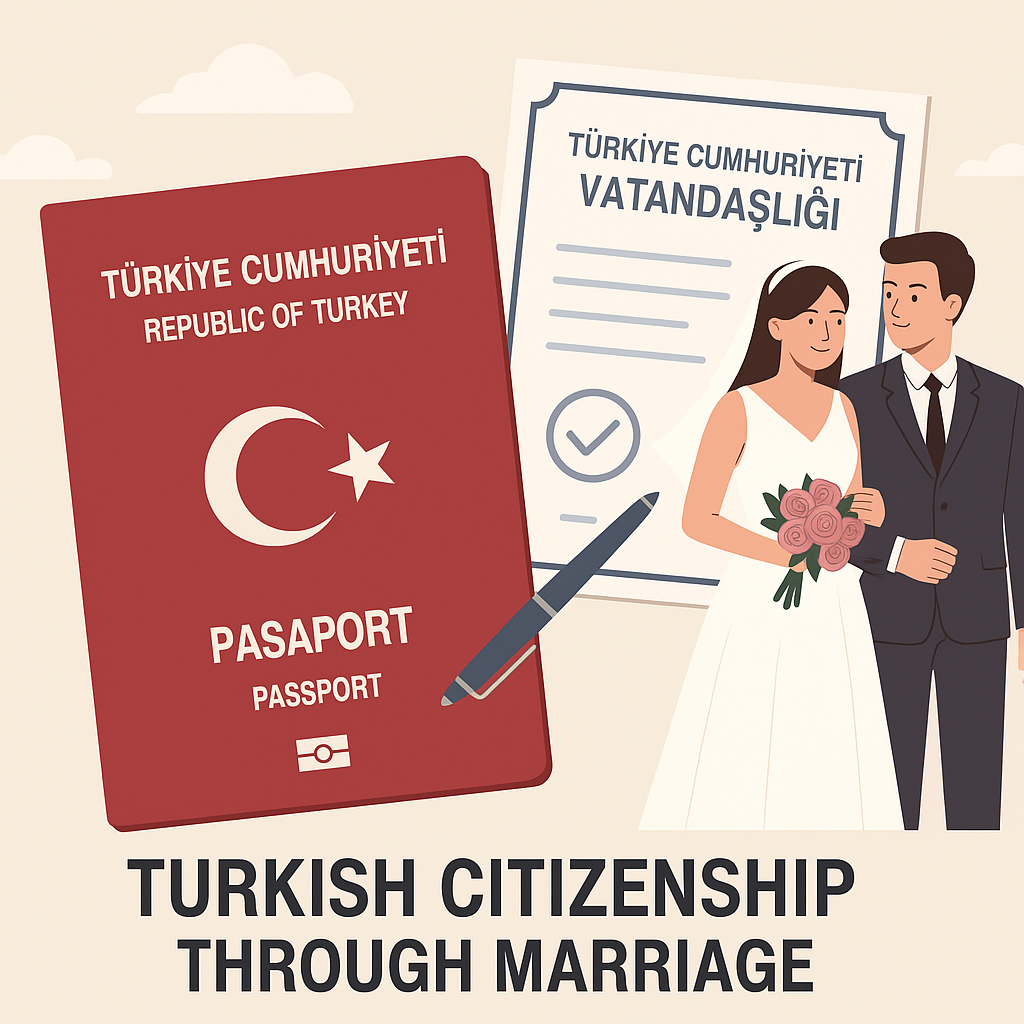INTRODUCTION
Applying for Turkish Citizenship Through Marriage is one of the most common legal grounds for acquiring Turkish nationality. However, the process is subject to strict conditions under Law No. 5901 on Turkish Citizenship and relevant regulations. Many applications are rejected not because the marriage is invalid, but due to procedural mistakes or lack of proper documentation. This article provides a detailed overview of the requirements and highlights frequent mistakes applicants should avoid.
LEGAL FRAMEWORK
Law No. 5901 on Turkish Citizenship (Turkish Citizenship Law)
Regulation on the Implementation of the Turkish Citizenship Law
Relevant administrative practices of the Ministry of Interior – General Directorate of Civil Registration and Citizenship Affairs (Nüfus ve Vatandaşlık İşleri Genel Müdürlüğü)
REQUIREMENTS FOR CITIZENSHIP THROUGH MARRIAGE
1. Valid and Genuine Marriage
The applicant must be married to a Turkish citizen through a legally recognized marriage (both under Turkish law and international private law rules).
Religious-only marriages are not sufficient.
2.Minimum Duration of Marriage
At least three years of marriage before applying.
The couple must continue to live together during the application process.
3. Proof of Cohabitation and Genuine Union
Authorities check whether the marriage is real or a “marriage of convenience.”
Joint residence, shared financial responsibilities, and social life are important indicators.
4. No Threat to Public Order or National Security
Applicants must not have criminal records or activities considered dangerous by security authorities.
5. Good Faith Requirement
Applicants must enter the marriage in good faith. If it is established that the marriage was concluded solely for the purpose of acquiring Turkish citizenship, the application will be rejected. Even after citizenship is granted, evidence of a sham marriage can lead to the revocation of Turkish citizenship under Law No. 5901. Authorities carefully examine cohabitation, social ties, and the couple’s genuine intent to maintain a family life.
COMMON MISTAKES LEADING TO REJECTIONS
1.Applying Before Completing 3 Years of Marriage
Early applications are automatically rejected.
2.Not Proving Cohabitation
Living in separate addresses without a valid reason (e.g., work or study abroad) often leads to rejection.
3.Insufficient Documentation
Missing documents such as marriage certificates, residence permits, or proof of cohabitation delay or block the process.
4. Divorce or Separation During the Process
If the marriage ends before citizenship is granted, the application is canceled.
5. Security Concerns
Previous criminal investigations or involvement in activities deemed against public order can lead to rejection, even if the marriage is genuine.
JUDICIAL REVIEW OF REJECTED APPLICATIONS
Rejected applicants have the right to appeal to administrative courts in Turkey.
Turkish courts review whether the administration respected the law and procedural fairness.
PRACTICAL TIPS FOR APPLICANTS
Ensure all documents (marriage certificate, residence permit, proof of address) are updated and legalized.
Maintain evidence of a genuine marital relationship (joint lease agreements, bank accounts, utility bills).
Consult with an experienced immigration and citizenship lawyer to avoid procedural errors.
DURATION OF THE PROCESS
The timeline for applying for Turkish citizenship through marriage varies depending on the applicant’s individual circumstances and the workload of the authorities. On average, the process takes between 6 and 12 months from the date of application.
- Initial Evaluation (1–3 months): Authorities review the application, required documents, and conduct preliminary checks.
- Security and Cohabitation Investigations (3–6 months): Officials may visit the couple’s residence or conduct interviews to confirm the authenticity of the marriage.
- Final Decision (2–3 months): After all verifications, the Ministry of Interior issues its decision, and successful applicants are granted Turkish citizenship.
Delays are common if documentation is incomplete, translations are missing, or if the couple cannot demonstrate continuous cohabitation. Seeking professional legal guidance can help applicants avoid unnecessary delays and ensure that the process runs smoothly.
CONCLUSION
Acquiring Turkish citizenship through marriage is a legally recognized and valid method. However, the process is strictly regulated, and mistakes can easily lead to rejection. Applicants should be well-informed about the requirements and prepared with proper documentation. Professional legal guidance is often the key to a successful application.
Turkish lawyer Ferhat Küle and his firm advise international clients on obtaining Turkish citizenship via marriage.

Yanıt yok